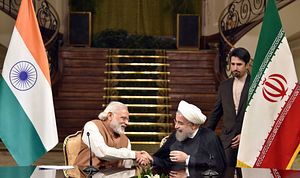In an attempt to further tighten the screws on Iran, the Trump administration announced earlier this week that it would not renew waivers that allowed eight foreign governments, including India, to continue buying Iranian oil without facing U.S. sanctions. Sanctions on Iranian oil purchases were reimposed in November last year as part of Trump’s decision to withdraw from the Joint Comprehensive Plan of Action (JCPOA). To balance out its radical decision on Iran, the Trump administration also granted sanctions waivers to eight countries — China, India, Japan, Turkey, Italy, Greece, South Korea and Taiwan — for a period of 180 days. Italy, Greece, and Taiwan have already stopped importing Iranian oil and so the impact of this latest decision will be felt by the remaining five, though it is far from clear if they would be sanctioned immediately in case they continue importing Iranian oil after May 2.
This decision came weeks after the Trump administration’s announcement to officially designate Iran’s Revolutionary Guard Corps (IRGC) as a “foreign terrorist organization.” This is the first time an entire government entity has been labelled a foreign terrorist organization, signalling a new toughening of U.S. pressure vis-à-vis Tehran. The designation of the IRGC, a veritable power center in Iran’s polity under the direct control of Ayatollah Ali Khamenei, will result in the freezing of assets in the U.S. and a ban on Americans doing business with the Guard.
But it’s the decision on oil trade that will have global repercussions. The Trump administration is downplaying the consequences arguing that “the United States, Saudi Arabia, and the United Arab Emirates, three of the world’s great energy producers, along with our friends and allies, are committed to ensuring that global oil markets remain adequately supplied.” U.S. Secretary of State Mike Pompeo has argued that the Saudis and Emiratis have assured “they will ensure an appropriate supply for the markets,” though he did not provide any specifics. So the United States is banking on Saudi Arabia and other major oil producers to help offset the shortfall from Iranian oil being taken off the market.
The global response to the United States has been along predictable lines. The EU has regretted the U.S. decision even as the UN has challenged the U.S. interpretation of Iranian compliance with restrictions on its nuclear program. India, Turkey, South Korea, and Japan all have close ties with the United States and will find it difficult to navigate the Iran question in the short term. China, of course, is a major oil partner for Iran. Not surprisingly, China has reacted strongly to the U.S. decision, saying it opposes “unilateral” sanctions and “long-arm jurisdictions imposed” by the United States. Beijing has argued that it remains “committed to upholding the legitimate rights and interests of Chinese companies and will play a positive and constructive role in upholding the stability of global energy market.”
For India, oil imports are key to sustaining its economic growth trajectory as they are needed to meet 80 percent of energy requirements. Iran is the third largest source of oil for India after Saudi Arabia and Iraq. Managing ties with Iran has been a perennial problem for Indian foreign policy and all governments over the last few years have had to reduce oil imports from Iran to balance demands from Washington. The Chabahar port project, however, will not be impacted by the recent U.S. decision as it is a separate exemption.
India will have to find other sources for its oil imports, but those nations may not provide the same benefits as provided by Iran such as a 60-day credit period, free insurance, and cheaper freight. There have been suggestions that the United States may offer concessions on oil imports to India similar to the ones offered by Iran, but those negotiations have only just begun. Given India’s requirements it would be difficult for India to cease its oil imports from Iran completely though it is likely that it would cut its intake and make the payment in rupee via escrow accounts.
New Delhi cannot afford to ignore Washington’s toughening of stance vis-à-vis Tehran at a time when transnationalism is the norm in American foreign policy. While ties with Iran are important, India will have to be pragmatic as it seeks a new balance between the United States and Iran. Much like in the past, the Iran question will continue to bedevil India-U.S. ties, but unlike in the past India is in a much stronger position to preserve its equities in this triangular contestation.

































